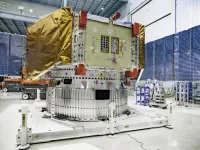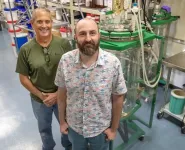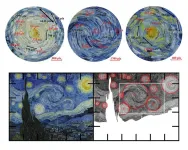(Press-News.org) Cancer cells seldom start off stealthy. Quite to the contrary, they announce their presence to the immune system by planting chemical red flags right on their membranes. Once alerted, the body’s defenses can swoop in, destroying rogue cells before they can do much damage. Lying at the heart of this early warning system are lipids, fatty compounds previously seen by cancer biologists primarily as a fuel source for burgeoning tumors.
But now, a new study in Nature demonstrates that one particular lipid type is actually critical for cancer immune evasion—so much so that certain cancer cells cannot proliferate without it. The findings confirm longstanding suspicions that not only is this lipid a key player in cancer biology (and therefore a key drug target), but also demonstrate that existing FDA-approved medications designed to stunt lipid production can galvanize the immune system against cancer.
“Cancer cells are altering how this lipid is metabolized, which in turn distorts the ‘eat me’ signals that malignant cells usually produce,” says first author Mariluz Soula, a former graduate student in the laboratory of Kivanç Birsoy, and now a scientist Lime Therapeutics. “This paints a very different picture of the role lipids play in cancer growth.”
A mysterious connection between lipids and cancer
Scientists have long known that cancer cells alter lipid metabolism, but it was generally assumed that cancer cells were gobbling up these lipids for energy—consuming the fatty molecules to help the tumor grow and spread far beyond that of healthy cells.
“We knew from the literature that elevated lipid levels correlate with severity of cancer growth and metastasis, but it was unclear how,” Soula says. The Birsoy lab, in conjunction with the laboratory of Gabriel D. Victoria, set out to answer this question by screening the genes involved in this process. They then implanted a series of cancer cells, each missing a different such gene, into mice with and without immune systems—thereby revealing which lipids a cancer cannot live without.
The result: so-called “sphingolipids.” Discovered in the late 1800s by German chemist Johann Ludwig Wilhelm Thudichum, sphingolipids were named after the enigmatic Sphinx of Greek lore because of their puzzling structure and function. Two centuries later, sphingolipids are less of a mystery. “We know that sphingolipids aren’t really used for energy,” Soula says. “They’re mainly in the cell membrane to create scaffolding for signaling proteins.”
This finding raised an intriguing possibility. Was lipid metabolism in cancer cells really just the story of hungry cells trying to consume more energy? Or was it a key part of the cancer cell’s efforts to subtly manipulate cell signaling and dodge the immune system?
Toward a new therapeutic strategy
To test how sphingolipids were driving cancer growth, the team turned to an FDA-approved drug used to treat Gaucher disease—a genetic disorder characterized by an impaired ability to break down lipids. The drug essentially blocks glycosphingolipid synthesis, and the team found that this impaired tumor growth in pancreatic, lung, and colorectal cancer models.
They also found that depleting glycosphingolipids prevented the formation of the “lipid nanodomains” that bunch signalizing molecules together on the membrane, impacting the cell’s surface receptors on the cell surface in a way that made them more sensitive to an immune response. These findings suggest that cancer cells hoard glycosphingolipids in order to obscure inflammatory signals, and that disrupting glycosphingolipid production can leave cancer cells vulnerable to the immune system.
“Everyone thought of elevated lipid levels as an energy source for cancer cells to consume,” Soula says. “We discovered that it’s far more nuanced. Lipids are not just fuel, but a protection mechanism for cancer cells that modulates how they communicate with the immune system.”
Future work will determine whether this holds true for multiple cancers. The team tested a variety of types, but found this mechanism at work in KRAS-dependent cancers (so named for the mutated oncogene that drives them). Still, the initial results could have significant clinical impact, given how aggressive many KRAS-dependent cancers, such as pancreatic cancer, tend to be. Based on their findings, the team suggests that drug and dietary interventions that stunt sphingolipid production may help increase the efficacy of existing immunotherapies.
“Diets may impact many aspects of cancer biology,” Birsoy says. “We believe modulating dietary lipids may be an interesting avenue to target cancer cells’ ability to evade immune cells.”
END
Cancer cells may be using lipids to hide from the immune system
2024-09-17
ELSE PRESS RELEASES FROM THIS DATE:
NASA completes spacecraft to transport, support Roman Space Telescope
2024-09-17
The spacecraft bus that will deliver NASA’s Nancy Grace Roman Space Telescope to its orbit and enable it to function once there is now complete after years of construction, installation, and testing.
Now that the spacecraft is assembled, engineers will begin working to integrate the observatory’s other major components, including the science instruments and the telescope itself.
“They call it a spacecraft bus for a reason — it gets the telescope to where it needs to be ...
University of Health Sciences earns $5.3 million from NIH to boost cancer research, support emerging scientists
2024-09-17
A $5.3 million National Institutes of Health grant awarded to the University of Oklahoma Health Sciences will support advanced cancer research in Oklahoma. The Centers of Biomedical Research Excellence (COBRE) grant is designed to build research capacity and help early-career researchers establish independently funded laboratories.
This is the third and final phase of the COBRE grant, which was first awarded in 2012, followed by phase two in 2017. The grant has supported and paralleled the growth of OU Health Stephenson Cancer Center, Oklahoma’s ...
Central America could play troubling new role in cocaine trade
2024-09-17
COLUMBUS, Ohio – For many decades, the coca plant – the main ingredient in cocaine – has been grown almost exclusively in South America. But a new study shows that nearly half of northern Central America appears to be highly suitable for cultivating this lucrative cash crop.
Findings showed that 47% of Honduras, Guatemala and Belize have the right climate and soil for commercial coca growing. Most of southern Central America was not suitable.
It’s not a hypothetical concern. Researchers began ...
SwRI and UTSA will create synthetic process for antibiotic drug discovery
2024-09-17
SAN ANTONIO — September 17, 2024 —Southwest Research Institute (SwRI) is collaborating with The University of Texas at San Antonio (UTSA) to explore and develop a novel platform or chemical process for synthesizing antibiotic compounds with a $125,000 grant. The project, one of two winning proposals this cycle, is supported by the Connecting through Research Partnerships (Connect) program designed to foster collaboration between SwRI and UTSA.
“SwRI and UTSA will work together to combat the growing threat antimicrobial resistance poses to global health by developing a proof-of-concept platform to potentially create a whole ...
Norwegian Afghanistan veterans more prone to anger
2024-09-17
From 2001 to 2021, roughly 9200 Norwegian soldiers served in Afghanistan. The vast majority of them have managed well in the years that have followed. According to a new survey conducted by the Norwegian Armed Forces Joint Medical Services, however, a significant number of the veterans struggle with mental health issues.
“All Norwegian veterans who served in Afghanistan were invited to participate in a large health survey in 2020,” says Associate Professor Andreas Espetvedt Nordstrand at the Norwegian University of Science and Technology ...
Black hole pairs may unveil new particles
2024-09-17
In a paper published in Physical Review Letters this week, physicists from Amsterdam and Copenhagen argue that close observations of merging black hole pairs may unveil information about potential new particles. The research combines several new discoveries made by UvA scientists over the past six years.
Gravitational waves that are emitted by the merger of two black holes carry detailed information about the shape and evolution of the orbits of the components. A new study by physicists Giovanni Maria Tomaselli and Gianfranco Bertone from ...
Amsterdam UMC led research sets a step forward in the battle against MRSA
2024-09-17
Staphylococcus aureus, mostly known from its antibiotic-resistant variant Methicillin-resistant Staphylococcus aureus (MRSA), is among the leading causes of both community- and hospital-acquired infections. According to the most recent data, MRSA killed around 120,000 people in 2022 globally and far more are killed by antibiotic-susceptible strains of S. aureus. So far however, all attempts at developing a protective vaccine for S. aureus have been unsuccessful. Research from Amsterdam UMC, in collaboration with UMC Utrecht, Leiden University, and the University of California, San Diego, have discovered an important immune component that offers protection against infection, ...
Childhood trauma linked to major biological and health risks
2024-09-17
A new study led by UCLA Health found that a person’s sex and their unique experiences of childhood trauma can have specific consequences for their biological health and risk of developing 20 major diseases later in life.
Although a large body of research has shown that childhood adversity can have long-lasting impacts on a person’s biology and health, there has been little research looking into how different types of stressors affect specific biological functions and health risks.
The new findings, published in the journal ...
Beneath the brushstrokes, van Gogh’s sky is alive with real-world physics
2024-09-17
WASHINGTON, Sept. 17, 2024 – Vincent van Gogh’s painting “The Starry Night” depicts a swirling blue sky with yellow moon and stars. The sky is an explosion of colors and shapes, each star encapsulated in ripples of yellow, gleaming with light like reflections on water.
Van Gogh’s brushstrokes create an illusion of sky movement so convincing it led atmospheric scientists to wonder how closely it aligns with the physics of real skies. While the atmospheric motion in the painting cannot be measured, the brushstrokes can.
In an article published this week in Physics ...
Excess body weight and the risk of second primary cancers among cancer survivors
2024-09-17
About The Study: In this cohort study of older survivors of nonmetastatic cancer, those who had overweight or obesity at the time of their first cancer diagnosis were at higher risk of developing a second cancer, especially an obesity-related second cancer. Given the high prevalence of overweight and obesity among cancer survivors, it is important to promote survivorship care guidelines recommending weight management and increase awareness of second cancers among physicians and cancer survivors.
Corresponding author: To contact the corresponding author, Clara Bodelon, Ph.D., M.S., email clara.bodelon@cancer.org
To access the embargoed study: Visit our For The ...





